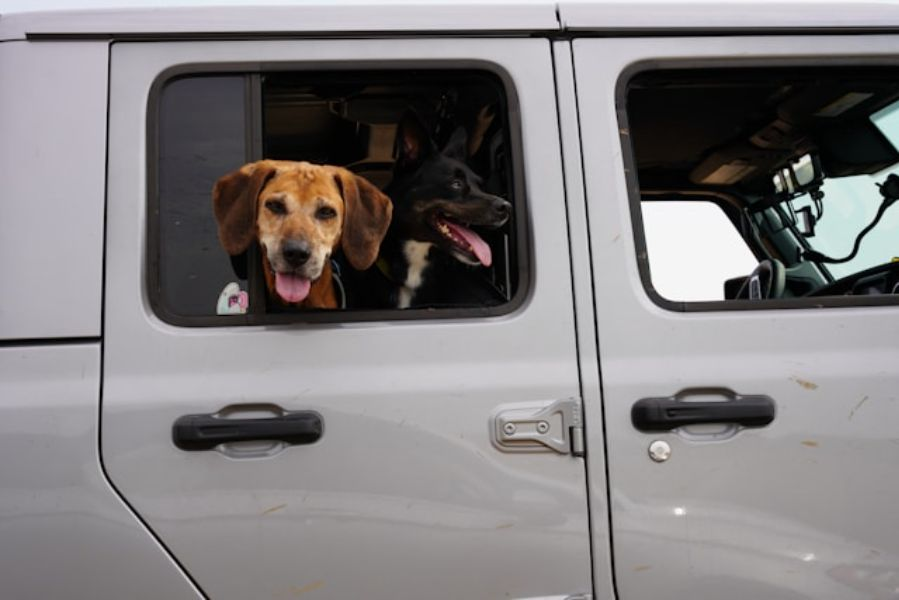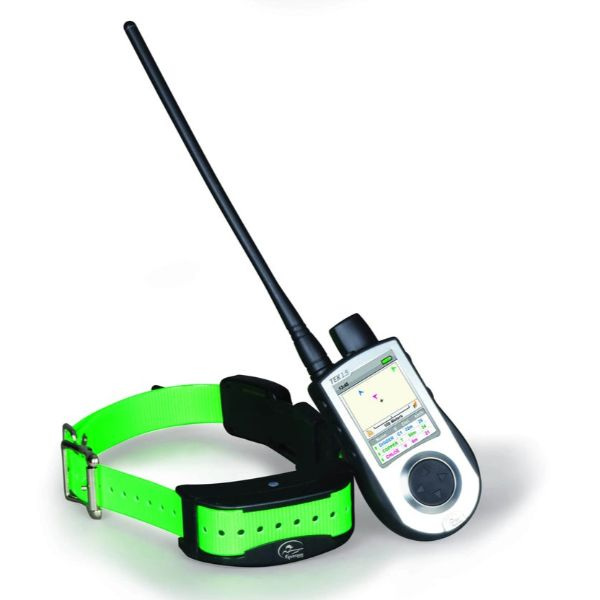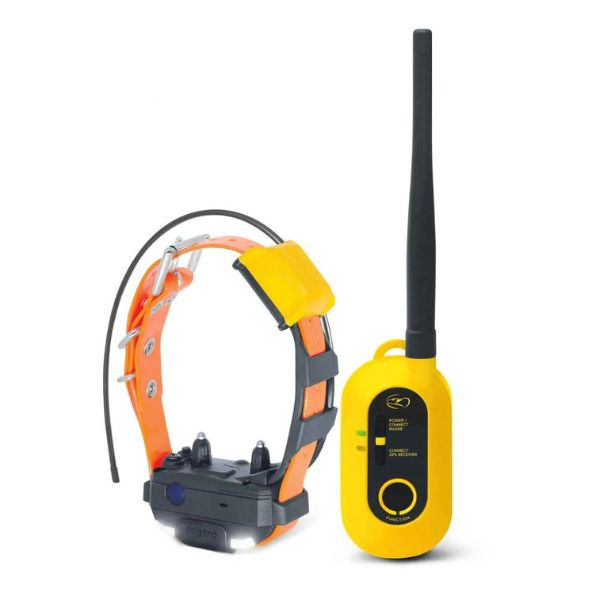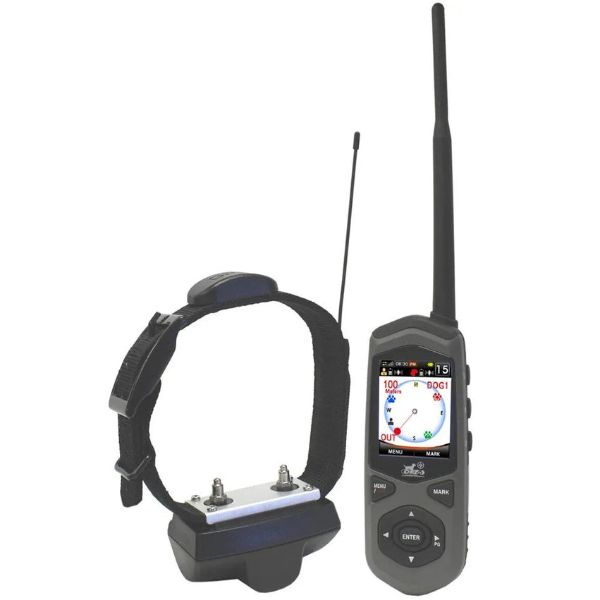737-215-3211

Ultimate Guide to Pet Safety: Best GPS Dog Collars For Traveling
Embarking on an adventure with your furry friend adds a layer of joy and excitement to any trip. Yet, the thought of your beloved puppy wandering into the unknown can quickly turn that joy into worry. In the bustling chaos of travel, ensuring your furry companion's safety becomes paramount.
The answer to your problems: dog GPS trackers.
But what are pet GPS tracking collars and their uses? This ultimate guide to pet safety with the best dog GPS trackers will help you.
Let's explore the world of GPS dog tracking collars!
Importance of GPS Dog Trackers for Traveling Pets
Traveling with pets can be an enriching experience, offering shared adventures and memories that last a lifetime. However, it also introduces a unique set of risks and challenges, particularly the fear of a lost pet or, in worse cases, being stolen.
As pet parents, the safety and well-being of our furry companions are always top priorities. This is where dog collars with GPS come into play, offering a modern solution to an age-old problem.
Risks for Traveling Pets
As pet parents, it's important to always know where your dogs are, especially when traveling. However, emergencies do happen. Here are 3 risks in traveling with your furry friends.
-
Getting Lost: New surroundings can be disorienting for pets. An open door or a split-second distraction can lead to a pet wandering off.
-
Theft: Unfortunately, pet theft is a reality, especially for certain breeds.
-
Accidents: Pets may accidentally wander into dangerous areas, like busy roads or rough terrains, putting them at risk of injury. That's why it's a necessity to keep your bigger and smaller dogs in their leashes to avoid accidents.
Benefits of Using a GPS Collar
The use of a GPS tracker for pets has become increasingly popular among pet owners, especially for a dog master escape artist. These Bluetooth trackers offer a multitude of benefits that go beyond mere location tracking. Here are some of the key advantages of using GPS dog collars:

Enhanced Safety and Peace of Mind
Knowing you can locate your dog in real-time offers peace of mind. Whether your dog escapes the yard, gets lost during a hike, or is in a situation where they might be in danger, a GPS tracker ensures you can find and retrieve them quickly.
Virtual Fences and Safe Zones
A GPS dog's collar often comes with the ability to set up virtual boundaries or safe zones. If your pet crosses these predefined areas, you receive instant notifications on your phone or device. It allows for proactive measures to prevent pets from wandering into dangerous or off-limits areas.
Activity Tracking and Monitoring
Many dog GPS tracker collars also function as activity monitors, tracking your pet's daily movements, exercise levels, and even rest periods. This information can be invaluable for ensuring your pet gets enough physical activity for their age, breed, and health condition.
Training Assistance
Some GPS collars are equipped with features that can assist in training your dog. For example, they might include tone or vibration alerts that can help with recall training or correct unwanted behavior. This multifunctionality makes GPS dog collars a versatile tool for both safety and training purposes.
Travel and Adventure Companion
A pet tracker allows for the safe exploration of new environments, giving pets the freedom to explore while assuring owners that they can live tracking their pet's whereabouts, anytime.
Convenience and Ease of Use
GPS trackers are designed for convenience, with user-friendly apps that allow pet owners to monitor their pets' location and activity levels easily. These apps often provide detailed Google maps, activity reports, and customizable alerts, all accessible from your smartphone or tablet.
Social Sharing and Community Support
Some GPS tracker apps offer features for social sharing, allowing pet owners to share their pets' adventures and activities with friends or within a community of pet owners. Also, in the unfortunate event that a pet goes missing, having a community to help in the search can be beneficial.
Long-Term Health Insights
Over time, the data collected by a GPS tracker can provide valuable insights into your pet's health and behavior patterns. Monitoring activity levels, changes in behavior, and even noting patterns in sleeping can help pet owners and veterinarians identify potential health issues early, ensuring timely and effective treatment.
How Dog GPS Trackers Work
A GPS dog collar is a sophisticated piece of technology designed to keep track of your pet's location, ensuring their safety and giving you peace of mind. Here's how these innovative GPS-tracking devices work:
GPS Technology at Its Core
At the heart of a GPS tracker is the Global Positioning System (GPS), a network of about 30 satellites orbiting the Earth. These GPS satellites transmit signals that can be received by devices equipped with a GPS receiver, such as your dog's collar equipped with this technology.

Receiving Satellite Signals
The GPS dog collar contains a receiver that picks up signals from satellites. By calculating the time it takes for the signals to travel from the satellites to the receiver, the device can determine the collar's tracker's location coordinates on Earth.
Real-Time Tracking and Data Transmission
Once the collar has calculated its position, it uses a cellular network to transmit this data to a server or directly to the owner's smartphone app. This allows for real-time tracking range, enabling pet owners to see their dog's location on a map through a dedicated app. Some devices may also use Wi-Fi, Bluetooth, or even satellite communications to send this information.
Features Beyond Simple Location Tracking
Modern GPS dog tracker comes packed with a variety of features, like a lost dog mode, to enhance the safety and well-being of your pet:
-
Virtual Fences: Owners can set up safe zones (geofences) through the app. If the pet crosses these boundaries, the owner receives escape alerts. This is beneficial if you're hiring a dog walker.
-
Activity Monitoring: Many devices also monitor the pet's activity levels, tracking their movements, rest periods, and sometimes even their health data.
-
History Log: Some collars store location history, allowing owners to see where their pet has been over a period of time.
-
Compatibility and Connectivity: These collars are designed to be compatible with smartphones, tablets, or computers, ensuring you can monitor your pet from anywhere. Just ensure your GPS dog tracker is within the Bluetooth range or GPS coverage.
Factors to Consider when Choosing a Dog GPS Tracker
When selecting a GPS tracker for your dog, there are several crucial factors to consider to ensure the safety and well-being of your furry friend, especially during travels.
Accuracy and Reliability
The GPS tracker should provide precise location data, enabling you to pinpoint your dog's exact location with minimal error margin. Reliable signals are essential for quick and efficient tracking. This ensures that, whether your pet wanders off in a densely wooded area or an urban setting with high structures, you can locate them with confidence.

Battery Life
Since GPS dog collars rely on continuous data transmission to provide real-time tracking, they are equipped with rechargeable batteries. Battery life can vary significantly between models, influenced by the frequency of real-time location tracking updates, the complexity of tasks the GPS dog tracker performs, and the type of network used for data transmission.
Long battery life is crucial to ensure that the collar remains functional and can keep track of your pet, especially in situations where charging may not be readily available.
Consider a device that offers a balance between functionality and battery life, bearing in mind that real-time tracking features can consume significant power. Devices with power-saving modes can be advantageous, extending battery life without compromising your ability to monitor your pet.
Range
The tracker's range is another important consideration, particularly if you travel or live in areas with varying cellular coverage. Some GPS dog trackers use a combination of GPS and cellular technology to offer widespread coverage, while others may rely on different technologies, like Wi-Fi or Bluetooth, for localized tracking.
Size and Weight
The comfort of your pet is paramount, making the size and weight of the GPS tracker crucial factors.
A bulky or heavy tracker can be uncomfortable or even harmful to smaller breeds, potentially affecting their movement or causing distress. Conversely, larger dogs may require sturdier GPS dog tracker devices like the Dogtra Pathfinder 2 TRX Extra Receiver Collar.
The ideal GPS dog tracker is one that your pet can wear comfortably for extended periods, without hindrance to their natural movements or behavior, like the Garmin T 5X Tracking Dog Device.
Waterproofing and Durability
Durability and waterproofing are essential, especially for active dogs or those living in areas prone to inclement weather. Waterproof pet trackers ensure continuous functionality. Also, the GPS dog tracker should be built to withstand the rough and tumble of a dog's daily activities.
Monthly Fees
Some GPS trackers require a monthly or annual subscription to access all features, including real-time tracking and historical data. When choosing a GPS dog tracker, it's important to consider the long-term costs associated with these fees.
Evaluate the benefits provided by the subscription plan to determine if it offers value for your investment.
Virtual Fences and Alerts
Virtual fences and alerts allow you to set safe zones and receive instant notifications if your pet leaves these areas. It is crucial for immediate action if your dog wanders off, providing an added layer of security and peace of mind.

Look for devices that offer customizable alerts and easy-to-set boundaries that suit your specific needs.
Compatibility and Connectivity
Lastly, the GPS tracker's compatibility and connectivity with your smartphone or other devices are crucial for ease of use. Most trackers come with a dedicated app available to iOS and Android users, offering features like real-time tracking, activity monitoring, and more.
Ensure the app is user-friendly and provides a seamless connection to the GPS dog tracker, allowing for easy monitoring and management of your pet's safety.
Best GPS Dog Trackers
There are many dog GPS trackers in the market. Here are our top 3 picks to choose from!
SportDOG Tek Series 1.5 GPS and E-Collar
The SportDOG Tek Series 1.5 GPS and E-Collar is a versatile tool for dog owners, particularly those who are serious about outdoor activities and training with their canine companions. One of its standout features is the combination of GPS tracking and training capabilities in a single device.

Pros:
-
Integrated GPS and E-Collar: Combines real-time tracking with training capabilities, ideal for outdoor activities.
-
Long Range: Offers up to 7 miles of range for both GPS tracking and e-collar functions, ensuring wide coverage.
-
Waterproof Design: Suitable for all weather conditions, allowing for versatile use in various environments.
-
Comprehensive Features: Equipped with a wide range of functionalities tailored for rigorous training and tracking.
Cons:
-
Steep Learning Curve: The wealth of features may require a significant time investment to master.
-
High Price Point: Comes at a premium cost, with an additional subscription fee for full feature access.
-
Frequent Charging Needed: While the battery life is adequate, heavy usage necessitates regular charging, which can be inconvenient during prolonged outdoor sessions.
The SportDOG Tek Series 1.5 stands out for its advanced tracking and training capabilities, designed for serious dog owners and outdoor enthusiasts.
Dogtra Pathfinder 2 Mini GPS E-Collar
The Dogtra Pathfinder 2 Mini GPS E-Collar stands out for its precision and reliability in tracking and training small to medium-sized dogs. Designed specifically for smaller breeds, this device offers a compact and lightweight solution without compromising on the robust features Dogtra is known for.

Pros:
-
Precision Tracking: Offers real-time GPS tracking with a detailed map, ideal for monitoring small to medium-sized dogs accurately.
-
Customizable Training Options: Features sound, vibration, and static stimulation, catering to diverse training needs.
-
Impressive Range: Provides up to 4 miles of range for both GPS tracking and training, ensuring control over long distances.
-
Waterproof Design: Fully waterproof, perfect for adventures in any weather conditions.
-
Designed for Smaller Dogs: Compact and lightweight, making it suitable for smaller breeds without causing discomfort.
Cons:
-
Complex Setup: The initial setup process can be complicated, requiring time to familiarize with the system and app.
-
High Price Point: May be considered expensive for pet owners looking for basic tracking and training functionalities.
-
Smartphone Dependency: Requires a smartphone to operate, which might not suit all users' preferences.
Pathfinder 2 Mini's targeted design for smaller dogs and its combination of advanced tracking and training capabilities make it a compelling choice for serious dog trainers and owners looking for high-quality, durable GPS e-collars.
D.T. Systems Border Patrol: GPS Dog Short-Range Tracking Unit
The D.T. Systems Border Patrol: GPS Dog Containment System, Remote Trainer, and Short-Range Tracking Unit is an all-in-one solution that combines the functionality of a containment system, a training device, and a tracking unit.

Pros:
-
All-in-One Solution: Combines a GPS containment system, remote trainer, and short-range tracking in one device, offering comprehensive pet management.
-
Custom Virtual Fences: Allows for the creation of specific boundaries, ensuring pets stay within safe limits while roaming freely.
-
Versatile Training Options: Includes beep, vibration, and shock functionalities for effective behavioral training across various distances.
-
Real-Time Tracking: Provides immediate location updates, enhancing the ability to monitor your pet's whereabouts for added safety.
Cons:
-
Complex Setup and Management: The multifunctionality leads to a steep learning curve, making it challenging for some users to utilize all features effectively.
-
Varied Effectiveness: Performance can be inconsistent in challenging terrains or urban settings, potentially limiting its reliability.
-
Cost Considerations: The initial purchase price and ongoing maintenance for the GPS feature may be significant for some buyers.
Tips for Traveling with a GPS Pet Tracker
Here are some practical tips for traveling with a GPS dog collar, covering everything from fitting and testing to maintenance and legal considerations.
-
Gradual Introduction: Start by letting your dog wear the collar for short periods each day, gradually increasing the time as they get comfortable.
-
Positive Reinforcement: Use treats and praise to create positive associations with wearing the collar to reduce their anxiety or discomfort.
-
Consistency is Key: Consistently use the collar during dog walks and outings before your trip, so it becomes a normal part of their routine.
-
Fit the Collar Correctly: Ensure the GPS collar fits your dog snugly without being too tight; you should be able to fit two fingers comfortably between the collar and your dog's neck.
-
Test the Device: Before you leave, test the GPS pet collar in various locations around your home and neighborhood to ensure it tracks accurately and consistently. Check the real-time tracking feature and any safe zone alerts you plan to use.
-
Check Battery Life: Fully charge the pet collar and monitor how long the battery lasts in normal conditions. This gives you a good idea of how often you'll need to recharge it during your trip.
-
Regular Checks: Regularly check the collar for signs of wear and tear, especially if your dog is active or enjoys playing in rough terrain.
-
Software Updates: Ensure the collar's software is up to date. Manufacturers often release updates that improve functionality and fix bugs.
-
Understand Local Regulations: Research the regulations regarding pets and GPS tracking devices in your destination. Some countries may have restrictions on radio frequencies or require special documentation.

Choose the Best GPS Collars for Dogs at Puppy Fever Pro
GPS dog collars are useful for all pet owners, especially if you love to travel with your beloved pets. However, not all the trackers are made equal. To ensure your GPS tracker is high-quality and durable, only trust a reliable store like Puppy Fever Pro.
We have a wide variety of dog training collars for different pet sizes and breeds. Browse through our dog supplies and pet products today!
For more dog owner tips, tricks, and updates, visit our blogs.


Leave a comment